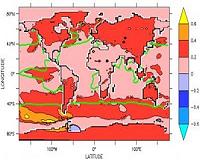| . |  |
. |
Boulder CO (SPX) Feb 24, 2010 Mass media have been a key vehicle by which climate change contrarianism has traveled, according to Maxwell Boykoff, a University of Colorado at Boulder professor and fellow of the Cooperative Institute for Research in Environmental Sciences, or CIRES. Boykoff, an assistant professor of environmental studies, presented his research at the annual meeting of the American Association for the Advancement of Science in San Diego. He spoke during a panel discussion titled "Understanding Climate Change Skepticism: Its Sources and Strategies." Boykoff's segment was titled "Exaggerating Denialism: Media Representations of Outlier Views on Climate Change" and discussed prominent pitfalls. "One problem occurs when outlier viewpoints are not individually evaluated in context," said Boykoff. "A variety of influences and perspectives typically have been collapsed by mass media into one general category of skepticism. This has been detrimental both in terms of dismissing legitimate critiques of climate science or policy, as well as amplifying extreme and tenuous claims." Such claims are amplified when traditional news media position noncredible contrarian sources against those with scientific data, in a failed effort to represent opposing sides, said Boykoff. Another issue in mass media is the tendency to flatly report on both the claims of contrarians, as well as the accusations made about their claims and motives, he said. The ensuing finger-pointing plays into the conflict, drama and personalized stories that drive news. It also distracts attention from critical institutional and societal challenges regarding carbon consumption that calls citizen behaviors, actions and decisions to account. "Reducing climate science and policy considerations to a tit-for-tat between dueling personalities comes at the expense of appraising fundamental challenges regarding the necessary de-carbonization of industry and society," said Boykoff. Among various and ongoing research strategies, Boykoff - in partnership with Maria Mansfield from Exeter University and the University of Oxford - has tracked climate change coverage in 50 newspapers in 20 countries and six continents since 2004. Boykoff also has looked at how climate science and policy find meaning and traction in people's everyday lives through work in the United States, United Kingdom and India. Speakers Stephen Schneider from Stanford University; Naomi Oreskes from the University of California, San Diego; William Freudenburg from the University of California, Santa Barbara; and Riley Dunlap from Oklahoma State University joined Boykoff on the panel.
Share This Article With Planet Earth
Related Links University of Colorado at Boulder Boykoff's research Climate Science News - Modeling, Mitigation Adaptation
 Ocean Geoengineering Scheme No Easy Fix For Global Warming
Ocean Geoengineering Scheme No Easy Fix For Global WarmingSouthampton UK (SPX) Feb 23, 2010 Pumping nutrient-rich water up from the deep ocean to boost algal growth in sunlit surface waters and draw carbon dioxide down from the atmosphere has been touted as a way of ameliorating global warming. However, a new study led by Professor Andreas Oschlies of the Leibniz Institute of Marine Sciences (IFM-GEOMAR) in Kiel, Germany, pours cold water on the idea. "Computer simulations show t ... read more |
|
| The content herein, unless otherwise known to be public domain, are Copyright 1995-2010 - SpaceDaily. AFP and UPI Wire Stories are copyright Agence France-Presse and United Press International. ESA Portal Reports are copyright European Space Agency. All NASA sourced material is public domain. Additional copyrights may apply in whole or part to other bona fide parties. Advertising does not imply endorsement,agreement or approval of any opinions, statements or information provided by SpaceDaily on any Web page published or hosted by SpaceDaily. Privacy Statement |